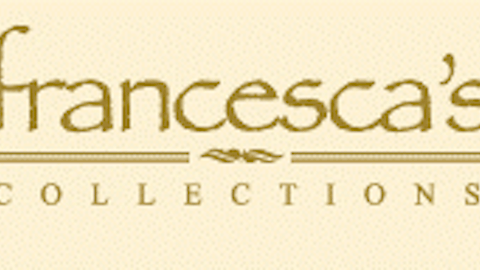Right now, a stronger housing market means better prospects for Williams-Sonoma, Inc. (NYSE:WSM) as shoppers buy new decorations, silverware, and furniture for their homes. Interest in high end cooking appliances could also add big ticket sales for this retailer. The company can also benefit from shoppers’ interest in self-sufficiency and disaster preparation as well. Stores in the Middle East and Australia offer international growth. This retailer doesn’t have the cheapest stock in the home furnishing business, though.
Williams-Sonoma had a good third quarter, although its retail chains experienced mixed results. In a 3Q 2012 press release, Williams-Sonoma reported 11.1% quarterly sales growth for Pottery Barn and 13% sales growth for West Elm, but the flagship Williams-Sonoma brand only achieved 1.3% revenue growth. Overall, the chain achieved 8.9% higher sales and 12.6% higher income for the quarter. With a 19 trailing P/E and a 16 forward P/E on the morning of February 6, Pier 1 Imports, Inc. (NYSE:PIR) is priced for growth. Pier 1 Imports, Inc. (NYSE:PIR) and Bed Bath & Beyond Inc. (NASDAQ:BBBY) also had a good quarter, illustrating overall home furnishing market strength.
Pier One achieved 10.9% revenue growth for the quarter, although the retailer’s 3% income growth wasn’t as impressive as Williams-Sonoma’s figure. Valuation metrics suggest that Pier One might slow down in 2013 as well, as the chain had a trailing P/E of 13 and a forward P/E of 16. Pier One’s five year PEG ratio of 0.96 does suggest better long term growth prospects. The Fool’s Jacob Roche provides some more detail about Pier One’s strategy, explaining that Pier One expanded its lineup of cheaper home decorations because pricy furniture wasn’t selling. Pier One’s recent sales growth suggests that this strategy continues to pay off, and low priced, attractive home decorations could ramp up the competitive pressure on Williams-Sonoma.
Bed Bath & Beyond looks relatively cheap with a trailing P/E of 14 and a forward P/E of 12. This chain racked up a 15.3% sales gain last quarter, although it only reported 1.8% earnings growth. Bed Bath & Beyond’s 1.04 PEG ratio also suggests a slight premium. Sales that strongly surpassed income may mean that Bed Bath & Beyond focused on price competition with other home furnishing stores, which could threaten Williams-Sonoma’s margins. Williams-Sonoma does have some projects of its own under way that could boost sales, and another firm showed some confidence in the home cooking market with a recent acquisition.
Home Cooking
The Williams-Sonoma product line includes high end stoves from Viking and other manufacturers. Williams-Sonoma isn’t the only company that could benefit if more shoppers buy Viking stoves. Commercial cooking equipment seller The Middleby Corporation (NASDAQ:MIDD) frequently buys other commercial cookware companies and adds their brands to its lineup, but this January Middleby shelled out $380 million for Viking. The Associated Press did just report that Middleby laid off 20% of the Viking workers and the CEO and founder of Viking, Fred Carl Jr., retired. Post-acquisition layoffs aren’t that unusual though, and the original acquisition announcement still seems like good news for Williams-Sonoma.
Self Sufficiency
Some homeowners go beyond simply skipping restaurant meals, embracing a do it yourself homesteading ethic that includes home canning, gardening, and even animal raising. A homeowner may get into homesteading to cut expenses or prepare for a disaster as well, such as the catastrophic Hurricane Sandy last year. Anh-Minh Le, at the San Francisco Gate, reported that Williams-Sonoma came out with its Agrarian homesteading line back in April 2012, and some urban gardeners questioned whether an upscale product line fits the do it yourself ethic. Nevertheless, Williams-Sonoma knows how to sell status symbols, and homesteaders in its target market might pay up for higher quality.
Shoppers can find cheap homesteading supplies at chains like The Home Depot, Inc. (NYSE:HD), Wal-Mart Stores, Inc. (NYSE:WMT), and Costco Wholesale Corporation (NASDAQ:COST), although a wealthy gardening hobbyist might still choose Williams-Sonoma over a discount store. Anne Marie Chaker, at the Wall Street Journal, points out (subscription required) that Williams-Sonoma could face future competition from Urban Outfitters, Inc. (NASDAQ:URBN) Terrain stores, which offer pricy products like a $58 garden hose.
Urban Outfitters has niche appeal of its own, along with a manager who understands how Williams-Sonoma’s marketing works. Lisa Gerard, at Home Channel News, reported that John Kinsella, who manages Terrain for Urban Outfitters, once worked as a manager for Williams-Sonoma. Terrain does need more time to become a major challenger to Williams-Sonoma, though. Urban Outfitters only has two Terrain stores right now.
International Growth
The franchise operator M.H. Alshaya helps retailers throughout the world expand into the Middle East, and the M.H. Alshaya store lineup now includes the premium Williams-Sonoma stores. M.H. Alshaya announced that Kuwait got a Williams-Sonoma store in November 2012. M.H. Alshaya also operates other Williams-Sonoma retail concepts in the Middle East, including Pottery Barn and West Elm. Williams-Sonoma also plans an expansion push for Australia, starting with a store in Sydney that opens in 2013, according to a press release.
Takeaway
Williams-Sonoma stands out on income growth in a peer comparison, and this home furnishing retailer also offers a 2% forward dividend yield. Housing remains the growth driver here, as more sales of Viking stoves or upscale gardening equipment would build on this main trend. Stores in the Middle East and Australia help the company benefit from other housing markets, but don’t change the main growth argument. Overall, the dividend looks like the most attractive reason to pick this stock instead of its peers.
The article Cooking Up Growth at Williams-Sonoma originally appeared on Fool.com and is written by Eric Novinson.
Copyright © 1995 – 2013 The Motley Fool, LLC. All rights reserved. The Motley Fool has a disclosure policy.






